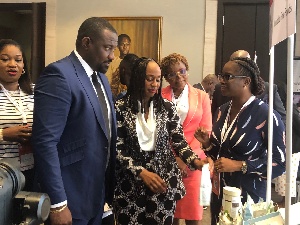- Home - News
- Elections 2024
- News Archive
- Crime & Punishment
- Politics
- Regional
- Editorial
- Health
- Ghanaians Abroad
- Tabloid
- Africa
- Religion
- Photo Archives
- Press Release
General News of Monday, 2 June 2025
Source: www.ghanawebbers.com
BRIDGE-in Agric: Mastercard Foundation unleashes $87m lifeline to revolutionise Ghana’s Agribusiness
A new $87 million initiative aims to transform agriculture in Ghana. This effort is a collaboration between the Mastercard Foundation and CrossBoundary Advisory.
The program is called the BRIDGE-in Agriculture Programme. It will provide affordable capital and technical support to Small and Medium Enterprises (SMEs) in agriculture.
Loan interest rates are capped at 7%. This offers vital financial help, especially for women and youth-led agribusinesses.
Beneficiaries will also receive hands-on training. This training aims to build capacity and resilience in a sector facing chronic underinvestment.
The program was launched on Thursday, May 29. Deputy Minister for Agriculture, John Dumelo, called it a “strategic breakthrough” for Ghana's agricultural transformation.
“Agriculture employs nearly 40% of Ghana’s workforce,” Mr. Dumelo noted. He added that it supports about 75% of the rural population.
However, he pointed out significant challenges like lack of finance, climate shocks, and poor infrastructure. He encouraged young people to take advantage of this opportunity: “Start small, grow gradually.”
Fanta Conde leads the BRIDGE-in Agriculture Programme. She said it was created in 2023 as a flagship solution by the Mastercard Foundation.
The Foundation provides partner banks with 0% interest grants. These grants help banks lend to agribusinesses at low rates while covering monitoring costs.
So far, around 86,000 Ghanaian youth aged 18 to 35 have benefited from the program. They have gained access to new or improved job opportunities in agriculture.
Participants are also receiving vocational and digital skills training from business development firms. These firms include Africa Skills Hub and Mind Builders Africa, supported by Peswa's digital platforms.
Partner banks like Access Bank, Ecobank, Fidelity Bank, First National Bank, Stanbic Bank, and Zenith Bank play a crucial role in delivering loans effectively.
With agriculture being central to Ghana’s economy but facing persistent gaps, this program could drive growth and innovation. It aims to bring dignity to work for the next generation of farmers and agripreneurs.











